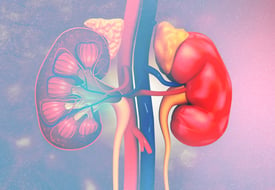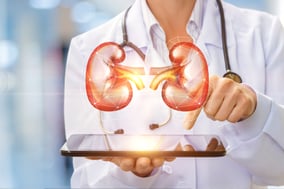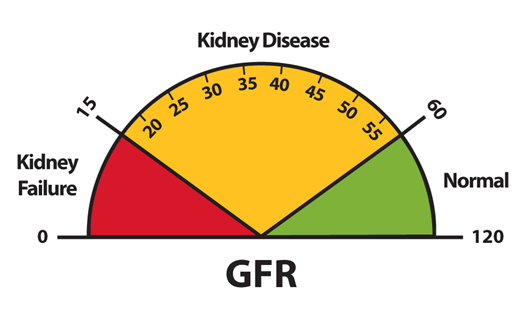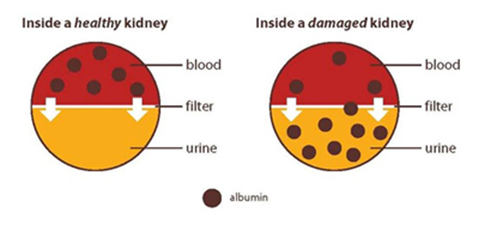If you answered "yes", you probably have some form of kidney disease.
What is CKD? What do Your Kidneys Normally do?
Chronic kidney disease is a gradual loss of the kidney’s ability to function normally. Normal kidneys filter out wastes and extra fluid in the blood through urine. In chronic kidney disease, the kidney function slowly deteriorates. This affects its ability to filter out wastes and excess water. This in turn leads to waste build up and fluid build up in your body. CKD is common among adults in the United States. More than 37 million adults in the US may have CKD.
What are the Causes of Kidney Disease?
The two main causes of kidney disease are diabetes and high blood pressure. These two causes are responsible for up to two thirds of all cases of CKD. Other causes include kidney disorders or other kinds of damage to the kidney.
Risk factors for CKD include diabetes, high blood pressure, cardiovascular disease, smoking, obesity, family history of kidney disease, abnormal kidneys, older age and being African American, Native American or Asian American.
What are the Symptoms of Chronic Kidney Disease?
 Early in the course of CKD there are little to no symptoms. As the disease progresses people with CKD can feel tired, have swelling, decreased appetite, nausea/vomiting, shortness of breath and decreases in how much they urinate.
Early in the course of CKD there are little to no symptoms. As the disease progresses people with CKD can feel tired, have swelling, decreased appetite, nausea/vomiting, shortness of breath and decreases in how much they urinate.
How is Kidney Disease Diagnosed?
Blood and urine tests are used to diagnose and to monitor progression of CKD. Some blood tests measure waste products that are normally filtered out by the kidney. Common blood tests that measure wastes are creatinine and urea. GFR or glomerular filtration rate is another blood test that provides a measure of how much the kidneys can filter. A normal GFR value is greater than 60. Less than 60 is consistent with kidney disease and less than 15 is consistent with kidney failure.
Urine testing checks for proteins, such as albumin, that healthy kidneys do not allow to pass into the urine.
What is Kidney Failure?
Kidney failure is when CKD reaches its end stage which is defined as less than 15% of normal kidney function. At this point treatments like dialysis or kidney transplant are needed to keep you healthy.
Does Kidney Disease Cause Other Problems?
Potential complications from having CKD include heart disease (stroke and heart attack), high blood pressure, fluid build up in the legs or lungs, weak bones, anemia and further damage to the kidneys.
What is Done to Manage CKD?
The goal of treatment for CKD is to slow the progression of kidney damage. This is typically done by managing blood sugars for diabetics and blood pressure for anyone with elevated blood pressure. There are some medications that also help to protect the kidneys.
What Can I do to Prevent CKD?
If you are diabetic or have high blood pressure, take your medications as prescribed and keep your appointments with your doctor. Keep your blood sugar and blood pressure under good control. Maintain a healthy weight. Don’t smoke. Follow instructions on over the counter medications as taking more of these medications than prescribed can damage your kidneys.
Are There any New Treatments for CKD?
There is a new FDA approved medication called Finerenone, that was tested and shown to slow the progression of CKD and decrease the risk of cardiovascular events in patients that also have diabetes. We participated in the Finerenone clinical trials along with other sites throughout the world! Presently, this drug is being tested in non-diabetic renal disease to determine if it has similar protective benefits.
Clinical Trials
Chase Medical Research has experience in conducting trials for CKD. If you are interested in participating in one of these trials or any of our other trials, don't hesitate to check out our website for currently enrolling trials.
References:
- Bakris, George L., et al. “Effect of Finerenone on Chronic Kidney Disease Outcomes in Type 2 Diabetes: Nejm.” New England Journal of Medicine, 3 Dec. 2020, https://www.nejm.org/doi/full/10.1056/NEJMoa2025845.
- “Chronic Kidney Disease (Ckd).” National Institute of Diabetes and Digestive and Kidney Diseases, U.S. Department of Health and Human Services, https://www.niddk.nih.gov/health-information/kidney-disease/chronic-kidney-disease-ckd.
- “Chronic Kidney Disease.” Mayo Clinic, Mayo Foundation for Medical Education and Research, 3 Sept. 2021, https://www.mayoclinic.org/diseases-conditions/chronic-kidney-disease/symptoms-causes/syc-20354521.
- “Facts about Chronic Kidney Disease.” National Kidney Foundation, 25 Feb. 2021, https://www.kidney.org/atoz/content/about-chronic-kidney-disease.
Share This Post
Recent Posts
- The Relationship Between Obesity and Obstructive Sleep Apnea October 6 2021
- Cardiovascular Outcome Clinical Trials October 6 2021
- Diabetic Peripheral Neuropathic Pain October 6 2021
- Are All Types of Cholesterol Bad? October 6 2021
- Blood Pressure: The Highs, the Lows, and Everything in Between October 6 2021
Categories
- Clinical Trials
- Cardiovascular Disease
- Diabetes
- Obesity
- Kidney Disease
- Hypertension
- Pain Management
- Vaccine
- Cholesterol
- Chronic Obstructive Pulmonary Disease
- Diabetic Peripheral Neuropathy
- Migraine
- Osteoarthritis
- Biologics
- COVID-19
- Gastroesophageal Reflux Disease
- Irritable Bowel Syndrome with Constipation
- Lyme Disease
- Nonalcoholic Steatohepatitis
- Respiratory Syncytial Virus





